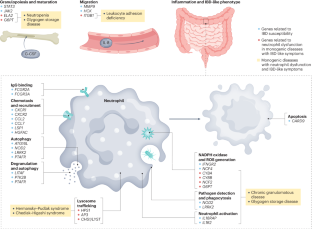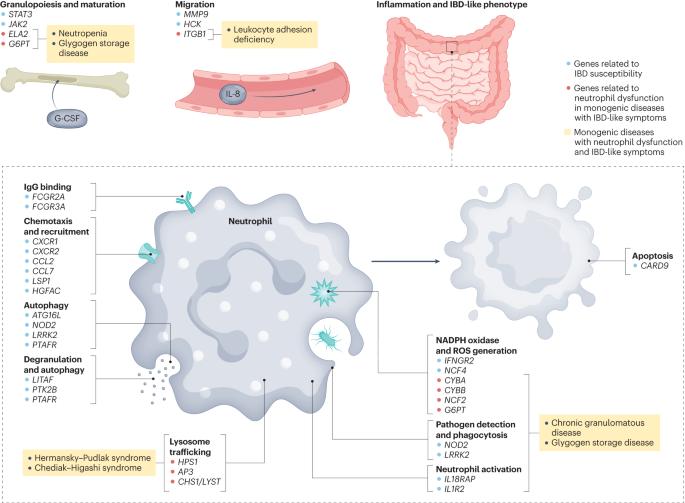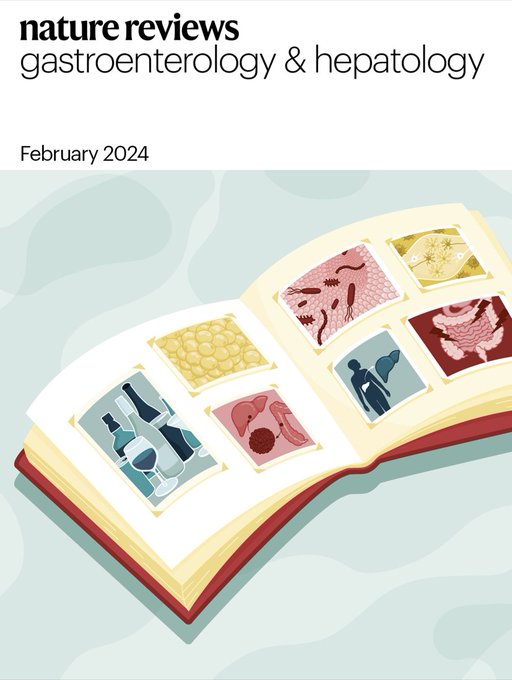Neutrophils: from IBD to the gut microbiota
IF 51
1区 医学
Q1 GASTROENTEROLOGY & HEPATOLOGY
引用次数: 0
Abstract
Inflammatory bowel disease (IBD) is a chronic inflammatory condition of the gastrointestinal tract that results from dysfunction in innate and/or adaptive immune responses. Impaired innate immunity, which leads to lack of control of an altered intestinal microbiota and to activation of the adaptive immune system, promotes a secondary inflammatory response that is responsible for tissue damage. Neutrophils are key players in innate immunity in IBD, but their roles have been neglected compared with those of other immune cells. The latest studies on neutrophils in IBD have revealed unexpected complexities, with heterogeneous populations and dual functions, both deleterious and protective, for the host. In parallel, interconnections between disease development, intestinal microbiota and neutrophils have been highlighted. Numerous IBD susceptibility genes (such as NOD2, NCF4, LRRK2, CARD9) are involved in neutrophil functions related to defence against microorganisms. Moreover, severe monogenic diseases involving dysfunctional neutrophils, including chronic granulomatous disease, are characterized by intestinal inflammation that mimics IBD and by alterations in the intestinal microbiota. This observation demonstrates the dialogue between neutrophils, gut inflammation and the microbiota. Neutrophils affect microbiota composition and function in several ways. In return, microbial factors, including metabolites, regulate neutrophil production and function directly and indirectly. It is crucial to further investigate the diverse roles played by neutrophils in host–microbiota interactions, both at steady state and in inflammatory conditions, to develop new IBD therapies. In this Review, we discuss the roles of neutrophils in IBD, in light of emerging evidence proving strong interconnections between neutrophils and the gut microbiota, especially in an inflammatory context. In this Review, Danne and colleagues describe the roles of neutrophils in inflammatory bowel disease, as well as their functions in host–microbiota interactions.


中性粒细胞:从肠道疾病到肠道微生物群
炎症性肠病(IBD)是一种胃肠道慢性炎症,是先天性和/或适应性免疫反应功能失调所致。先天性免疫功能受损会导致对改变的肠道微生物群缺乏控制,并激活适应性免疫系统,从而引发继发性炎症反应,造成组织损伤。中性粒细胞是 IBD 先天性免疫的关键角色,但与其他免疫细胞相比,它们的作用一直被忽视。对中性粒细胞在 IBD 中作用的最新研究揭示了意想不到的复杂性,中性粒细胞具有异质性种群和双重功能,对宿主既有害又有保护作用。与此同时,疾病发展、肠道微生物群和中性粒细胞之间的相互联系也得到了强调。许多 IBD 易感基因(如 NOD2、NCF4、LRRK2、CARD9)都与中性粒细胞抵御微生物的功能有关。此外,涉及中性粒细胞功能障碍的严重单基因疾病(包括慢性肉芽肿病)的特征是模仿 IBD 的肠道炎症和肠道微生物群的改变。这一观察结果表明了中性粒细胞、肠道炎症和微生物群之间的对话。中性粒细胞以多种方式影响微生物群的组成和功能。反过来,包括代谢物在内的微生物因子也会直接或间接地调节中性粒细胞的产生和功能。进一步研究中性粒细胞在稳态和炎症条件下宿主-微生物群相互作用中发挥的各种作用对于开发新的 IBD 疗法至关重要。在本综述中,我们将讨论中性粒细胞在 IBD 中的作用,因为新出现的证据证明了中性粒细胞与肠道微生物群之间的紧密联系,尤其是在炎症情况下。
本文章由计算机程序翻译,如有差异,请以英文原文为准。
求助全文
约1分钟内获得全文
求助全文
来源期刊
CiteScore
52.30
自引率
0.60%
发文量
147
审稿时长
6-12 weeks
期刊介绍:
Nature Reviews Gastroenterology & Hepatology aims to serve as the leading resource for Reviews and commentaries within the scientific and medical communities it caters to. The journal strives to maintain authority, accessibility, and clarity in its published articles, which are complemented by easily understandable figures, tables, and other display items. Dedicated to providing exceptional service to authors, referees, and readers, the editorial team works diligently to maximize the usefulness and impact of each publication.
The journal encompasses a wide range of content types, including Research Highlights, News & Views, Comments, Reviews, Perspectives, and Consensus Statements, all pertinent to gastroenterologists and hepatologists. With its broad scope, Nature Reviews Gastroenterology & Hepatology ensures that its articles reach a diverse audience, aiming for the widest possible dissemination of valuable information.
Nature Reviews Gastroenterology & Hepatology is part of the Nature Reviews portfolio of journals.

 求助内容:
求助内容: 应助结果提醒方式:
应助结果提醒方式:


